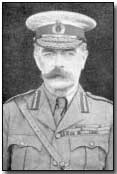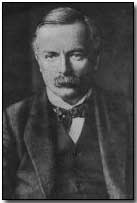Encyclopedia - The Shell Scandal, 1915
 The 'Shell Scandal', as it
became popularly and widely known, was generated by publication of the
British Commander-in-Chief's view that a shortage of munitions led directly
to the failure of the British offensive at
Neuve
Chapelle in March 1915.
The 'Shell Scandal', as it
became popularly and widely known, was generated by publication of the
British Commander-in-Chief's view that a shortage of munitions led directly
to the failure of the British offensive at
Neuve
Chapelle in March 1915.
In confiding his views to the Times war correspondent, Colonel Charles Repington, Sir John French set in train a political upheaval back home in London which ultimately contributed to his own recall as Commander-in-Chief at the close of the year (replaced by Sir Douglas Haig).
That the British Army were experiencing a shell shortage was not in doubt (although the historian Martin Gilbert has noted that more shells were discharged in the 35 minute preliminary bombardment at Neuve Chapelle than in the whole of the Boer War). British munitions production was not operating at full efficiency nor anything approaching it.
David Lloyd George, the Liberal Chancellor, fervently believed that a radical improvement to the munitions industry was not only possible but thoroughly necessary if the British were to compete with Germany in a long war. He did not however believe that the war secretary, Lord Kitchener, under whom responsibility for munitions production fell, was up to the task of delivering the required production overhaul.
Lloyd George therefore encouraged the proprietor of the powerful Times and Daily Mail newspapers, Lord Northcliffe, in the latter's determination to publish details of the 'shell scandal' in his newspapers. Northcliffe duly published an article by Repington on 14 May 1915 claiming that the fault of the matter lay with the War Office and in particular with Lord Kitchener. The resultant uproar was not restricted to the political elite.
 In
spite of a growing view in the Cabinet that Lord Kitchener was not well
suited to his political role, he was revered in the country at large.
Regarded with awe, 'K of K' (Kitchener of Khartoum) the country was not yet
ready to believe ill of Kitchener of Khartoum. Circulation of
Northcliffe's newspaper consequently dipped.
In
spite of a growing view in the Cabinet that Lord Kitchener was not well
suited to his political role, he was revered in the country at large.
Regarded with awe, 'K of K' (Kitchener of Khartoum) the country was not yet
ready to believe ill of Kitchener of Khartoum. Circulation of
Northcliffe's newspaper consequently dipped.
Nevertheless Lloyd George achieved his aim. Even though by this time the bottleneck in shell production was opening up and supplies were increasing, the Liberal government fell on 25 May 1915 and a new coalition established (under the continuing Prime Minister Herbert Asquith). Lord Kitchener remained as minister for war.
Within the government a new department was created, the Ministry of Munitions, and its responsibility handed to Lloyd George.
A Kite Balloon was an observation balloon controlled by a cable from the ground.
- Did you know?
